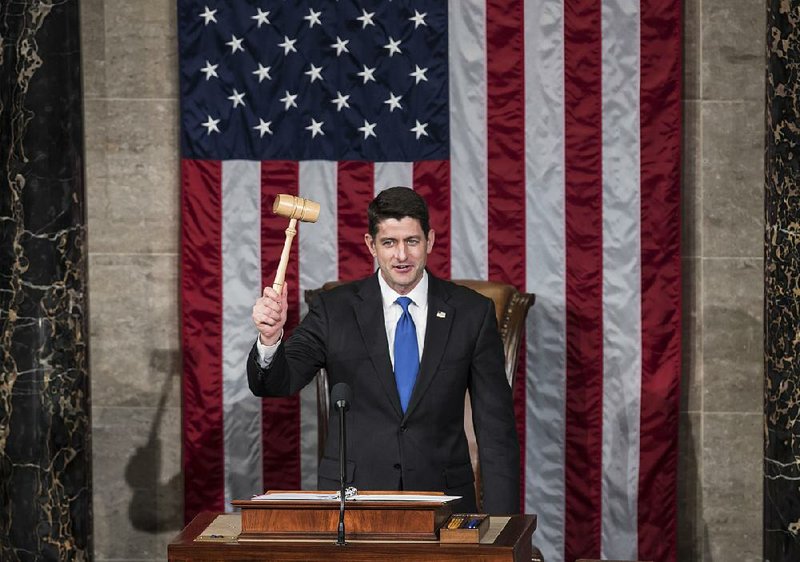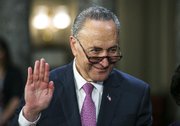WASHINGTON -- House Republicans, facing criticism from both parties and from President-elect Donald Trump, moved early Tuesday afternoon to reverse their plan to gut the Office of Congressional Ethics on the first day of business for the new Congress, a day when party leaders were hoping for a show of force to reverse policies of President Barack Obama's administration.
RELATED ARTICLE
http://www.arkansas…">Of four, only Westerman votes to gut ethics office
The reversal came less than 24 hours after House Republicans, meeting in a closed session, voted, over the objections of Speaker Paul Ryan, to eliminate the independent ethics office. It was created in 2008 in the aftermath of a series of scandals involving House lawmakers, including three who were sent to jail.
Republicans, led by Rep. Robert Goodlatte of Virginia, had sought to prevent the quasi-independent ethics office from taking up investigations that might involve criminal charges, and they wanted to grant lawmakers on the more powerful House Ethics Committee the right to shut down any of the inquiries. They also wanted to block the small staff at the Office of Congressional Ethics from speaking to the media.
"It has damaged or destroyed a lot of political careers in this place, and it's cost members of Congress millions of dollars to defend themselves against anonymous allegations," Rep. Steve King, R-Iowa, said Tuesday, still defending the move.
INTERACTIVE: What happened in the elections for Congress?
But the resolve to curb the powers of the Office of Congressional Ethics crumbled Tuesday morning as hundreds of phone calls flooded lawmakers' offices and both conservative and liberal ethics groups issued statements condemning the move. So did some Republican lawmakers, who said it was the wrong message to send to the public.
"It was a stumble," said Rep. Mark Sanford, R-S.C., who himself was the subject of an ethics investigation while he served as governor in South Carolina. "Probably not the way you want to start out."
Ryan, R-Wis., who had argued against the unilateral rules change Monday night, issued a statement Tuesday downplaying the change and insisting that the ethics office will operate independently though under the oversight of the House Ethics Committee, which is made up of lawmakers.
"All members of Congress are required to earn the public's trust every single day, and this House will hold members accountable to the people," Ryan said.
Ryan and Majority Leader Kevin McCarthy, R-Calif., had pressed for a bipartisan approach at a later date, but rank-and-file Republicans defied their leadership.
The 119-74 vote reflected the frustration of many lawmakers who have felt unfairly targeted by the ethics office, but it was a setback for leadership caught off guard by the swift action.
Goodlatte's proposal would have put the nonpartisan Office of Congressional Ethics under the control of the House Ethics Committee. "Any matter that may involve a violation of criminal law must be referred to the Committee on Ethics for potential referral to law enforcement agencies after an affirmative vote by the members," according to Goodlatte's office.
Lawmakers would have the final say on their colleagues under the change.
In a statement, Goodlatte said the rules amendment "builds upon and strengthens the existing Office of Congressional Ethics by maintaining its primary area of focus of accepting and reviewing complaints from the public and referring them, if appropriate, to the Committee on Ethics."
Democrats reacted angrily to the proposal, with Minority Leader Nancy Pelosi claiming ethics as "the first casualty of the new Republican Congress."
Outside observers said the new system would make it easier for corruption to flourish under Ryan and his leadership team.
"We all know the so-called House Ethics Committee is worthless for anything other than a whitewash -- sweeping corruption under the rug," Chris Carson, president of the League of Women Voters, said. "That's why the independent Office of Congressional Ethics has been so important. The OCE works to stop corruption and that's why Speaker Ryan is cutting its authority. Speaker Ryan is giving a green light to congressional corruption."
Trump tweets
Trump had also weighed in, suggesting that the House should instead be focused on domestic policy priorities. In postings on Twitter, Trump called the Office of Congressional Ethics "unfair," but he said turning attention to it now was a case of misplaced priorities. He appended the hashtag "DTS," an apparent allusion to his promise to "drain the swamp" in Washington.
"With all that Congress has to work on, do they really have to make the weakening of the Independent Ethics Watchdog, as unfair as it may be, their number one act and priority," Trump asked over Twitter the morning after the surprise and secretive move by the House GOP.
"Focus on tax reform, healthcare and so many other things of far greater importance!" he added.
Before Trump's tweets on the issue, Kellyanne Conway, a top Trump adviser, spoke supportively of the move. She said she had not talked to Trump directly about the issue but that under the previous system there had been "overzealousness" in going after lawmakers. "We don't want people wrongly accused," she said Tuesday on ABC's Good Morning America.
Sean Spicer, a spokesman for Trump's transition team, said Tuesday that Vice President-elect Mike Pence "equally shares the concern" Trump expressed in his Tuesday morning tweets.
"We were elected on a promise to drain the swamp, and starting the session by relaxing ethics rules is a very bad start," said GOP Rep. Tom McClintock of California.
McCarthy mentioned Trump's opposition in the emergency meeting, and some lawmakers said it had a powerful effect.
"I do believe when President-elect Trump tweeted out ... members got calls," said Rep. Lou Barletta, R-Pa. Trump spoke by phone with Ryan on Tuesday after the ethics change was dropped.
A stripped-down package was approved late Tuesday by the House, 234-193.
Later, Rep. Susan Brooks, R-Ind., the incoming House Ethics Committee chairman, told lawmakers that her panel would review bipartisan changes to the ethics office's mission in the coming months, culminating in a proposal to be delivered before the House's August recess.
Since it first started to take up cases in 2009, the Office of Congressional Ethics -- which has a budget of $1.4 million and a staff of nine, including five lawyers -- has provoked criticism from both Democrats and Republicans, particularly lawmakers such as former Rep. Mel Watt, D-N.C., and Rep. Sam Graves, R-Mo., who say it treated them unfairly during investigations.
Ryan and McCarthy had made clear as of Monday that they were also opposed to the ethics office's powers. On Tuesday, McCarthy said he broadly agreed with Trump's message position, which seemed to focus more on the timing of taking up the ethics issue rather than the substance of the complaints about it.
"Those are the same arguments I made last night in conference," he said, adding that he and Ryan did not have the power to simply tell other Republican members what to do.
"Welcome back," he joked, referring to the start of the new session of Congress on Tuesday.
Back to business
Once the ethics dispute was dispensed with, Congress returned to the ceremonial business. As set out in the Constitution, both chambers gaveled in at noon, and as storm clouds threatened outside, the halls of the Capitol filled with lawmakers' children, friends and spouses on hand to witness the procedures.
In the Senate, seven new members joined those who won re-election, taking the oath of office administered by Vice President Joe Biden. The Senate will be controlled 52-48 by the GOP and includes two new Republicans and five new Democrats. They include Illinois' Tammy Duckworth, a double-amputee Iraq war vet, who walked to the dais and stood for the oath.
Biden remains president of the Senate until Trump becomes president Jan. 20; then Pence will take over.
Senate Minority Leader Charles Schumer of New York set battle lines, saying Democrats will hold Trump to his promises to create jobs, raise incomes and protect Americans but will "fight him tooth and nail when he appeals to the baser instincts that diminish America and its greatness."
Issues confronting America are complex, he said. "'Making America Great Again' requires more than 140 characters per issue," he added.
The first bill introduced Tuesday in the chamber was budget legislation that contains instructions for committees in both chambers to begin dismantling the Affordable Care Act. The bare-bones spending outline gives members of four committees until Jan. 27 to produce bills that each save $1 billion over a decade by slashing elements of Obama's signature health-care law.
Senate GOP leaders must also allow Democrats to offer a nearly unlimited number of amendments before a final budget vote. Democrats plan to use the process, known as a "vote-a-rama," to offer a long string of potentially toxic amendments that could make it difficult for Republicans to vote for the final legislation, Democratic leadership aides said.
Republicans must also focus in the coming weeks on getting Trump's Cabinet nominees confirmed by the Senate. Democrats plan to resist some of Trump's picks.
In the House, lawmakers easily re-elected Ryan as their speaker. The House will number 241 Republicans and 194 Democrats; among the members are 52 freshmen.
"The people have given us unified government, and it wasn't because they were feeling generous, it's because they wanted results," Ryan said. "How could we live with ourselves if we let them down?"
Information for this article was contributed by Eric Lipton and Matt Flegenheimer of The New York Times; by Donna Cassata, Erica Werner, Matthew Daly, Mary Clare Jalonick, Richard Lardner, Andrew Taylor, Alan Fram and Kenneth Thomas of The Associated Press; and by Sean Sullivan, Mike DeBonis, Paul Kane, Ed O'Keefe, David Weigel, Robert Costa, Kelsey Snell, Scott Higham and Karoun Demirjian of The Washington Post.
A Section on 01/04/2017

